Choosing the right food for your beloved canine companion can be a daunting task. With hundreds of brands and thousands of formulas on the market, it’s easy to feel overwhelmed. Many dog owners simply stick with what their pet was fed at the shelter, opt for a familiar brand, or base their decision on price or a veterinarian’s general recommendation. While these approaches might occasionally lead to a suitable choice, they often result in a diet that isn’t optimally tailored to your dog’s unique needs. This guide, brought to you by Dog Care Story, will help you navigate the complexities of dog food selection, with a particular focus on finding the Best All Life Stages Dog Food to ensure your pet thrives.
No single food or even a single pet food company is universally “best” for all dogs. The ideal diet depends on factors such as age, activity level, health conditions, and even breed-specific requirements. However, “all life stages” dog foods offer a versatile and often excellent solution for many households, particularly those with puppies, pregnant or nursing females, or active adult dogs. To make an informed decision, understanding the underlying principles of dog nutrition and food labeling is crucial. If you’re considering preparing meals for your canine, exploring options like homemade dog food for small dogs can also be a valuable resource for ensuring nutritional balance.
Decoding Dog Food Labels: The AAFCO Statement
Every reputable dog food product carries a nutritional adequacy statement, often referred to as the AAFCO statement. This tiny but mighty piece of information confirms that the food is “complete and balanced,” meaning it contains all the necessary nutrients in appropriate amounts. The Association of American Feed Control Officials (AAFCO) developed these nutritional standards, distinguishing between two primary life stages: “growth and reproduction” (for puppies, pregnant, or nursing females) and “adult maintenance” (for mature dogs).
The term “all life stages” is critical here. If a food’s AAFCO statement references “growth,” “growth and reproduction,” or “dogs of all life stages,” it signifies that the formula meets the more demanding nutritional requirements of growing puppies and reproductive females. These stages necessitate higher levels of protein, fat, calcium, phosphorus, and other essential minerals compared to adult maintenance diets. Importantly, adult dogs can safely consume foods with these elevated nutrient levels. This flexibility makes “all life stages” dog foods a convenient and appropriate choice for a wide range of dogs, from energetic puppies to active adult companions.
Core Criteria for Selecting All Life Stages Dry Dog Food
When evaluating potential candidates for the best all life stages dog food, we apply a rigorous set of criteria to ensure quality and nutritional integrity. These standards go beyond basic calorie counts, delving into ingredient quality, macronutrient balance, and the inclusion of beneficial supplements.
Prioritizing High-Quality Protein Sources
For any dog food, especially those designed for all life stages, the protein source is paramount. We always look for formulas where meat and/or a meat meal (e.g., chicken meal, turkey meal) are listed among the top two ingredients. It’s even better if several animal-based protein sources appear within the first five or six ingredients. This indicates a diet rich in highly digestible animal protein, which is crucial for muscle development, energy, and overall health across all life stages. Plant-based proteins can play a supportive role, but animal proteins offer a superior amino acid profile for dogs.
Optimal Macronutrient Balance: Protein and Fat Levels
For all life stages foods, we aim for moderate protein levels. While AAFCO mandates a minimum of 20% “as fed” protein for growth, there’s no official maximum. However, few foods exceed 40% protein. We consider a protein level of around 30% (as fed) to be ideal for an all life stages formula, providing ample building blocks for growth and maintenance without being excessively high.
Fat content is also a key consideration. “Growth and reproduction” foods require a minimum of 7.65% fat (as fed). All life stages formulas typically exceed this, providing the necessary energy for active puppies and reproductive females, while still being suitable for adult dogs. Fat provides more than twice the calories per gram compared to protein or carbohydrates, making it a vital energy source.
Mindful Use of Carbohydrates and Legumes
Carbohydrates are an unavoidable component of dry kibble. We prefer to see complex carbohydrates like brown rice, barley, and oatmeal. While legumes such as peas, chickpeas, and lentils can provide nutrients, we prefer them in minor roles, appearing lower down on the ingredient list (below the 5th or 6th position). High inclusion of legumes has been a point of discussion regarding potential links to canine dilated cardiomyopathy (DCM), although current understanding suggests that proper taurine supplementation by manufacturers mitigates this risk. Nevertheless, prioritizing animal protein sources over excessive plant-based proteins and carbohydrates remains our preference.
Beneficial Supplements for Enhanced Health
A truly outstanding all life stages dog food will often include supplementary nutrients that go beyond the basic AAFCO requirements. We look for the inclusion of ingredients like probiotics (for gut health), taurine (essential for heart health, especially in formulas with high legume content), and glycosaminoglycans such as glucosamine and chondroitin (beneficial for joint health, particularly in growing puppies and active adults). Crucially, these supplements should be listed on the guaranteed analysis, indicating their presence in verifiable, beneficial quantities rather than just “token” amounts.
Our Top Recommendation for Best All Life Stages Dog Food
Based on our meticulous selection process, which emphasizes high-quality ingredients, appropriate nutrient profiles, and verifiable health benefits, we are proud to highlight a standout option for the best all life stages dog food.
Wellness Core Digestive Health Puppy Chicken & Brown Rice
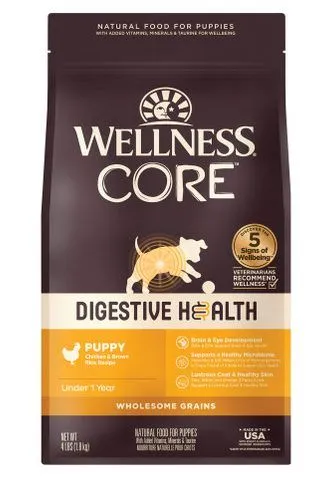 Wellness Core Digestive Health Puppy Chicken & Brown Rice dry dog food
Wellness Core Digestive Health Puppy Chicken & Brown Rice dry dog food
Why We Like It:
Wellness Core Digestive Health Puppy Chicken & Brown Rice excels in several key areas that align with our stringent criteria for an all life stages formula.
- Protein-Rich: It features three high-quality animal protein sources—deboned chicken, chicken meal, and turkey meal—within the first six ingredients. This ensures a robust supply of essential amino acids for growth and muscle maintenance.
- Essential Fatty Acids: The inclusion of marine micro-algae oil provides a vegan source of EPA and DHA. These omega-3 fatty acids are particularly beneficial for cognitive development in puppies and contribute to overall skin and coat health across all life stages.
- Comprehensive Nutrition: The guaranteed analysis proudly lists many extra nutrients, including EPA and DHA, and taurine. This transparency and commitment to complete nutrition are hallmarks of a high-quality food.
First 10 Ingredients: Deboned chicken, chicken meal, brown rice, barley, oatmeal, turkey meal, dried plain beet pulp, chicken fat, flaxseed, pumpkin.
Protein: Minimum 31%
Fat: Minimum 15.5%
Calories: 421 Kcal/cup
Cost: $3.15/lb
This formula represents a balanced and highly nutritious option that meets the diverse needs of dogs from puppyhood through adulthood.
Runners-Up in the All Life Stages Category
While Wellness Core is our top pick, several other brands offer excellent “all life stages” formulations that deserve recognition:
- DR. GARY’S BEST BREED Puppy Recipe: This option features chicken meal and brown rice, offering a balanced profile for growing dogs.
 Dr. Gary's Best Breed Puppy Recipe dry dog food* **Price/lb:** $2.45
Dr. Gary's Best Breed Puppy Recipe dry dog food* **Price/lb:** $2.45
* **Ingredients:** Chicken meal, Brown Rice, Oatmeal, Dried Beet Pulp, Chicken Fat (Preserved with Mixed Tocopherols), Dried Egg, Brewers Dried Yeast, Natural Chicken Flavor… - TENDER AND TRUE Small Breed Organic Turkey & Oats Recipe: An organic option with turkey and chicken meal leading the ingredients, suitable for small breeds.
 Tender and True Small Breed Organic Turkey & Oats Recipe dry dog food* **Price/lb:** $6.75
Tender and True Small Breed Organic Turkey & Oats Recipe dry dog food* **Price/lb:** $6.75
* **Ingredients:** Organic turkey, Organic chicken meal, Organic oats, Organic brown rice, Organic flaxseed, Organic tapioca starch, Organic chicken fat (preserved with mixed tocopherols), Organic chicken liver… - THE HONEST KITCHEN Whole Grain Chicken Clusters for Puppies: A whole-grain option with real chicken, oats, and barley, plus vegetables.
 The Honest Kitchen Whole Grain Chicken Clusters for Puppies dry dog food* **Price/lb:** $3.86
The Honest Kitchen Whole Grain Chicken Clusters for Puppies dry dog food* **Price/lb:** $3.86
* **Ingredients:** Chicken, oats, barley, chicken liver, carrots, eggs, ground flaxseed, broccoli…
These runners-up demonstrate strong commitment to quality ingredients and balanced nutrition for dogs at various developmental stages.
Why Choose All Life Stages Dog Food?
Opting for an “all life stages” dog food offers several advantages for dog owners, making it a popular choice.
- Versatility for Multi-Dog Households: If you have dogs of different ages—a puppy and an adult, or a pregnant female and an older dog—an all life stages food simplifies feeding. You can feed the same high-quality food to all, ensuring everyone receives adequate nutrition.
- Optimal for Growing Puppies: Puppies require a nutrient-dense diet to support their rapid growth and development. All life stages foods are specifically formulated to meet these higher demands, providing the protein, fat, and minerals crucial for healthy bone, muscle, and organ development.
- Suitable for Active Adults: Highly active adult dogs, working dogs, or canine athletes often benefit from the higher calorie and nutrient content found in all life stages formulas, providing sustained energy and supporting muscle recovery.
- Convenience: For owners who prefer a single, consistent food for their dog throughout its life (assuming no specific health issues arise later), an all life stages option offers convenience and continuity.
Distinguishing “All Life Stages” from “Adult Maintenance”
It’s important to understand the difference between an “all life stages” food and one formulated solely for “adult maintenance.” While “all life stages” foods meet the needs of growing and reproducing dogs (which includes higher nutrient levels), “adult maintenance” foods are designed for the needs of adult dogs who are no longer growing.
Adult maintenance foods often contain lower levels of protein and fat than “all life stages” formulas. However, AAFCO does not impose maximum levels for fat or protein for any life stage. Therefore, some adult maintenance foods might, paradoxically, contain more fat and protein than some all life stages options. This is why checking the guaranteed analysis for specific protein and fat percentages is always crucial, regardless of the AAFCO statement. Less active or overweight adult dogs, for instance, may benefit from specific adult maintenance foods with carefully controlled fat and protein levels. When comparing options, always examine the caloric content; fat’s high caloric density means even small differences in fat percentage can significantly impact a food’s total calories.
Beyond Life Stages: Other Important Considerations
While “all life stages” food is a great starting point, other categories of dry dog food cater to specific dietary needs that you might need to consider as your dog ages or if specific health concerns arise. Understanding these can help you fine-tune your dog’s diet. If you are interested in making your own food, finding healthy dog food recipes for small dogs can offer nutritious alternatives.
Low-Fat Dry Dog Foods
For inactive, overweight, diabetic dogs, or those prone to pancreatitis, low-fat foods are essential. AAFCO sets minimum crude fat levels (4.95% for adult maintenance, 7.65% for puppies), but there’s no upper limit. When fat is reduced, protein or carbohydrates (or both) will increase. We recommend a balanced approach with increased protein and carbs in low-fat diets.
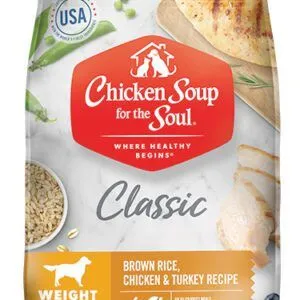 Chicken Soup for the Soul Classic Weight Care dry dog food
Chicken Soup for the Soul Classic Weight Care dry dog food
Our Pick: Chicken Soup for the Soul Classic Weight Care Dry Dog Food, Brown Rice, Chicken, & Turkey Recipe
- Things we like: Max fat % listed, multiple meats follow brown rice, peas in supportive role.
- Protein: Min 21%, Fat: Min 6%, Max 9%
High-Protein Dry Dog Food
Some dogs, particularly highly active dogs, fit senior dogs, or canine athletes involved in endurance or cold-weather activities, thrive on higher protein diets. While not strictly necessary for all dogs and generally more expensive, high protein can be beneficial for specific needs.
Our Pick: Rawz Meal-Free Dehydrated Chicken, Turkey, & Chicken Recipe
- Things we like: Multiple dehydrated meats and organ meats in top ingredients, moderate fat, added taurine.
- Protein: Min 40%, Fat: Min 12%
Limited Ingredient Dry Dog Food
For dogs with known or suspected ingredient sensitivities or allergies, limited ingredient diets (LID) are crucial for prevention or identification of triggers. We favor LIDs with as few major ingredients as possible to simplify the process of pinpointing problem ingredients.
 Essence LIR Ocean Recipe dry dog food
Essence LIR Ocean Recipe dry dog food
Our Pick: Essence LIR Ocean Recipe
- Things we like: Novel proteins from whitefish and herring, quinoa as a novel carb source.
- Protein: Min 35%, Fat: Min 17%
Grain-Free Dry Dog Food
The popularity of grain-free foods surged, often leading to the substitution of grains with other carbohydrates like potatoes and legumes. While the direct link between grain-free foods and DCM has been largely debunked, a suspected link between high legume inclusion and DCM still exists unless adequate taurine is supplemented. We recommend grain-free foods with low legume inclusion, especially for dogs with demonstrated issues thriving on grain-containing diets.
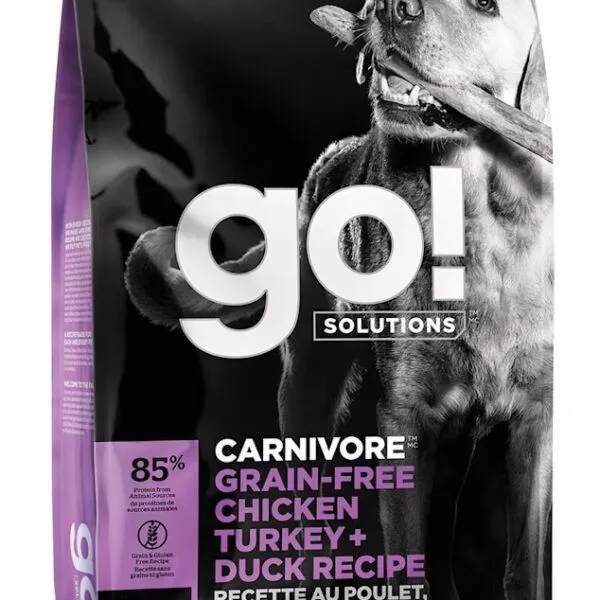 Petcurean Go! Solutions Carnivore Grain Free Chicken, Turkey + Duck Senior Recipe dry dog food
Petcurean Go! Solutions Carnivore Grain Free Chicken, Turkey + Duck Senior Recipe dry dog food
Our Pick: Petcurean Go! Solutions Carnivore Grain Free Chicken, Turkey + Duck Senior Recipe
- Things we like: Six meats/meat meals in top six spots, legumes are low on list, added taurine.
- Protein: Min 32%, Fat: Min 14%
Budget Dry Dog Foods
Even when on a budget, quality should not be entirely sacrificed. Our budget picks are more expensive than the absolute cheapest, as those often rely on unnamed animal by-products, highly processed grain by-products, and plant-based proteins as primary sources, which we cannot recommend. Our budget options still meet our quality criteria.
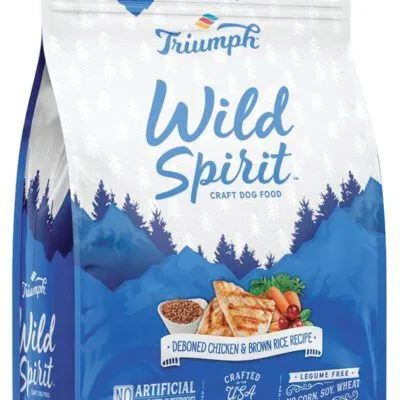 Triumph Wild Spirit Chicken & Brown Rice Recipe dry dog food
Triumph Wild Spirit Chicken & Brown Rice Recipe dry dog food
Our Pick: Triumph Wild Spirit Chicken & Brown Rice Recipe
- Things we like: Deboned chicken and chicken meal lead ingredients, multiple extra nutrients including probiotics.
- Protein: Min 25%, Fat: Min 15%
Alternative Proteins Dry Dog Food
For dogs with severe allergies to common animal proteins, or for owners with ethical or environmental concerns, alternative protein sources are emerging. These include vegetarian, vegan, and even insect-based diets. Note that most alternative protein foods are formulated for adult maintenance only, not puppies.
 Jiminy's Good Grub dry dog food
Jiminy's Good Grub dry dog food
Our Pick: Jiminy’s Good Grub
- Things we like: Eco-friendly, humane, sustainable; grub protein is highly digestible and prebiotic; baked not extruded.
- Protein: Min 28%, Fat: Min 14%
Conclusion
Selecting the ideal dog food is a critical decision that impacts your dog’s health and longevity. While the array of options can seem overwhelming, understanding the AAFCO statements and focusing on high-quality ingredients can simplify the process. For many dogs, especially growing puppies, active adults, or households with multiple canines, choosing the best all life stages dog food offers a convenient and nutritionally sound solution. Prioritize formulas with quality animal proteins, balanced macronutrients, and beneficial supplements. Always consult with your veterinarian to tailor the best dietary plan for your dog’s unique needs and health profile. Your thoughtful approach to nutrition will undoubtedly contribute to a happy, healthy life for your cherished companion.

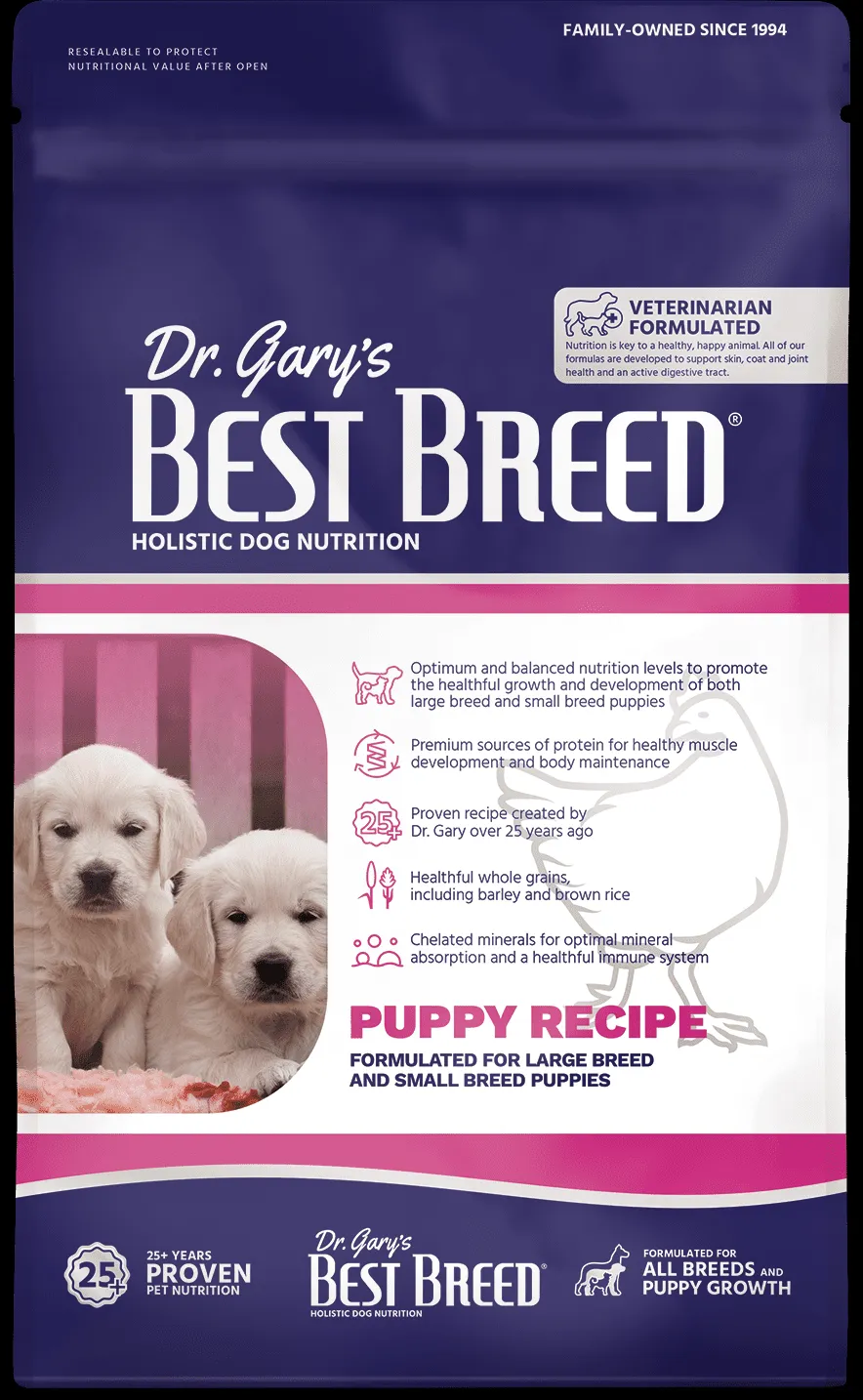 Dr. Gary's Best Breed Puppy Recipe dry dog food* **Price/lb:** $2.45
Dr. Gary's Best Breed Puppy Recipe dry dog food* **Price/lb:** $2.45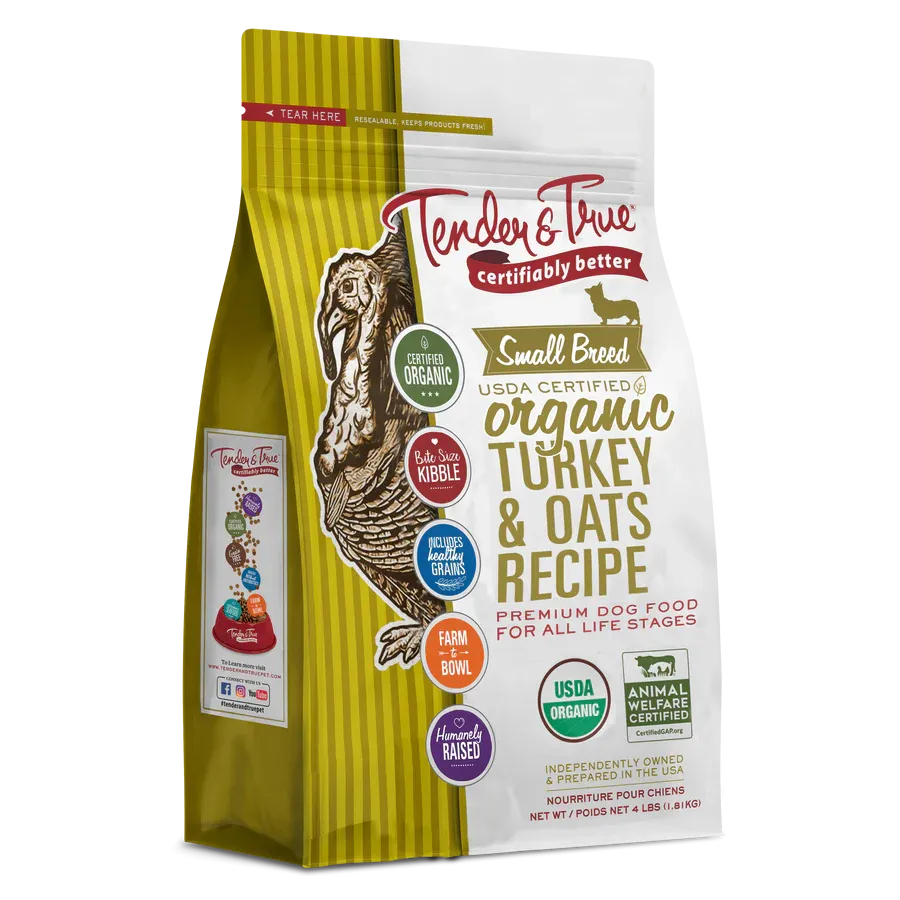 Tender and True Small Breed Organic Turkey & Oats Recipe dry dog food* **Price/lb:** $6.75
Tender and True Small Breed Organic Turkey & Oats Recipe dry dog food* **Price/lb:** $6.75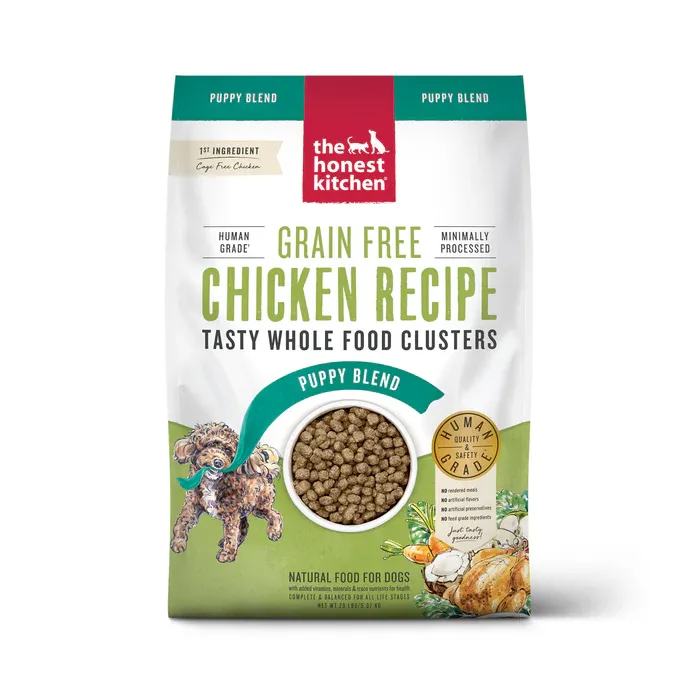 The Honest Kitchen Whole Grain Chicken Clusters for Puppies dry dog food* **Price/lb:** $3.86
The Honest Kitchen Whole Grain Chicken Clusters for Puppies dry dog food* **Price/lb:** $3.86